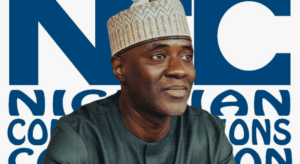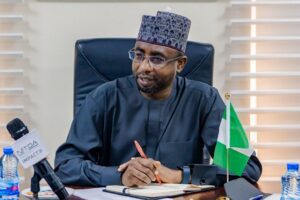Dr Bosun Tijani and the task of consolidating Nigeria’s Digital Economy
By Blessing
According to statistics, Africa currently accounts for only 1 per cent of the global digital economy, a stark contrast to 68 per cent in the United States, 22 per cent in China, and 27 per cent in Asia. This gap represents the huge gap left behind for Africa and the opportunity for growth. In this millennia, the digital economy plays a huge role in economic growth of a country.
In Nigeria, the Digital Economy received a huge boost under the previous administration of Professor Isa Ali Ibrahim Pantami between 2019 and 2023. The previous administration was able to enact various laws to engineer the process to create a viable ecosystem for Nigeria’s Digital Economy. Notable of mention is the National Digital Economy Policy and Strategy. However, there is still much to be done to effectively harness the potentials of Nigeria’s Digital Economy which houses some of the startups that have raised huge funds on the continent.
President Bola Ahmed Tinubu already has indicated his commitment to promote the growth of ICT and the digital economy for the shared prosperity of all Nigerians.
Following the footsteps of the first world countries, with his level of exposure in the IT industry, Minister for Communications, Innovation and Digital Economy, Dr Bosun Tijani elaborated on his plans to equip and strengthen Nigeria’s Digital Economy to boost the effectiveness of other sectors and increase the country’s Gross Domestic Profit (GDP), which is currently $506.6 billion. His policy is centered on analysing the accomplishments so far in the industry, and improving on it. The totality of his tenure, would be to “propel the Nigerian economy to a digitalized economy.”
“I look forward to working with all stakeholders to raise the level of productivity across our economy through the smart application of technology. It’s an exciting time to build a bigger and better future for all Nigerians,” Tijani said, minutes after official inauguration by the President, Bola Ahmed Tinubu.
Dr Tijani prior to his appointment was the co-founder and CEO of Co-Creation Hub in Nigeria (CCHub), which was founded in same year as the Communication ministry, 2010. Today, CCHub has grown across Africa, “making it a pan-African tech incubator, empowering young people with the tools, communities, and capital they need to launch impactful ventures.
Starting from a Diploma in Computer Science, Bachelors Degree in Economics in Nigerian Institutions, Tijani furthered to a Masters Degree in Information Systems and Management from Warwick Business School and a PhD in Innovation and Economic Development at the University of Leicester.
Before CCHub, Bosun Tijani worked as a Business Development Manager with DeliveryKing; Deployment Lead (Africa) with Hewlett Packard (HP), also worked with Global Micro-enterprises Acceleration Programme (GMEAP).
DOES THE SECTOR NEED MORE AGENCIES?
Tijani said his policies would adopt the gains of existing agencies and create more agencies in the sector to diversify activities. However, it is important to consider the importance of reducing the cost of governance as more agencies would mean more cost for the government. The Minister should also consider if there are any alternatives to create special purpose vehicles under the existing agencies or if the enabling law the existing agencies can be expanded to accommodate other areas of the Digital Economy that need to be touched.
Meanwhile, the Buhari-led administration approved the creation of the Nigeria Data Protection Commission (NDPC) before the exhaustion of its tenure.
TASKS BEFORE THE MINISTER:
SETTLE INTERCONNECT DEBT OWED BY BANKS TO MNOs
Following the large chunk of N150 billion debt owed to Mobile Network Operators (MNOs) by commercial banks since 2019, the network operators had earlier threatened to withdraw their Unstructured Supplementary Service Data (USSD) services.
The new Minister, Tijani, assumes office with incurred debts and is determined to resolve it as soon as possible, although the deadlock between both parties seemed to be a tie as several regulatory bodies, including the Central Bank of Nigeria (CBN) and the Nigerian Communications Commission (NCC), have attempted to quench the fire but to no avail.
The Chairman of the Association of Licensed Telecoms Companies of Nigeria (ALTON), Gbenga Adebayo however, called on the new communications minister, Dr Bosun Tijani, to intervene on the matter and as well, protect the independence of the regulator sector, NCC, to enable them work more effectively, highlighting that the last administration controlled the sector so much that it could achieve little.
The network operators believe that with lots of innovations in the communication industry, the 1 million digital job promised by President Tinubu would be actualized.
On another rising issue, Adebayo, speaking on behalf of stakeholders in the telecom industry lamented that the fuel subsidy removal is affecting the cost of their services, and causing an unsustainable end-user pricing for telecom services, given the prevailing cost structure.
BROADBAND PENETRATION
With its economic value to Nigeria’s capital GDP growth, broadband penetration is critical to the growth of Nigeria’ digital economy.
The Executive Vice Chairman of the Nigerian Communications Commission, NCC, Prof. Umar Danbatta had earlier noted that Nigeria will do everything to achieve the 70 per cent broadband penetration target by 2025, revealing that already, the country has achieved 50 per cent out of the target.
For Africa’s biggest economy that aims to be a fully digital economy, hitting the target and even exceeding it is a must. There have been varying growth levels in penetration but there are still places where network coverage is scarce. Truthfully, digital economy in Nigeria is only a mirage without a wide range of broadband penetration.
At a just concluded two-day workshop, low broadband penetration was one of the major challenges highlighted to be the cause of Nigeria’s low ranking in Network Readiness Index (NRI) across the globe.
Citing data from International Telecommunication Union (ITU), South Africa and Egypt have recorded 116 per cent and 77 per cent broadband penetration rates respectively while Kenya also leads Nigeria with 54 percent penetration rate.
POLICIES AND FUNDING FOR STARTUPS TO THRIVE
Being a technocrat from the private sector, it is expected that Tijani understands the difficulties startups grapple with. Two of which include unfavourable policies and funding. With the enactment of the Nigeria Startup Act and the creation of a Startup fund, Nigerians are expecting to see a rise in the number of startups being founded and dominating the ecosystem globally.
According to statistics, “The African startup space currently grapples with a funding drought that has resulted in a 37 per cent year-on-year funding decline to $4.1 billion as of June 2023. As of June 2022, startups in Africa had raised $6.5 billion.”
The Minister has acknowledged this and is committed to making policies that would create enabling environment for tech startups to thrive and grow in the country.
For a start, the Federal Government has announced that it will be collaborating with the Bank of Industry (BOI) to disburse $500m to businesses in the country to boost innovations.
Dr Bosun Tijani made this disclosure at a dinner hosted in his honour by the World Bank in Abuja. He noted that the funds will be utilised to boost innovation and entrepreneurship within Nigeria’s digital economy.
This would drastically reduce the JAPA rate of Nigeria’s tech experts and of course create more opportunities for youths in the country.
Furthermore, funding of indigenous innovations and technologies would drastically reduce the impact of high forex exchange rate on Nigerians, as ALTON earlier mentioned.
CONCLUSION
The tasks ahead of Dr Bosun Tijani to consolidate Nigeria’s digital economy are enormous. However, being a technocrat who is young and tech savvy gives Nigerians hope that President Tinubu made the right choice by appointing him as the Minister for Communication, Innovation and Digital Economy. His years of experience in the tech space is expected to bring renewed hope to the industry.




